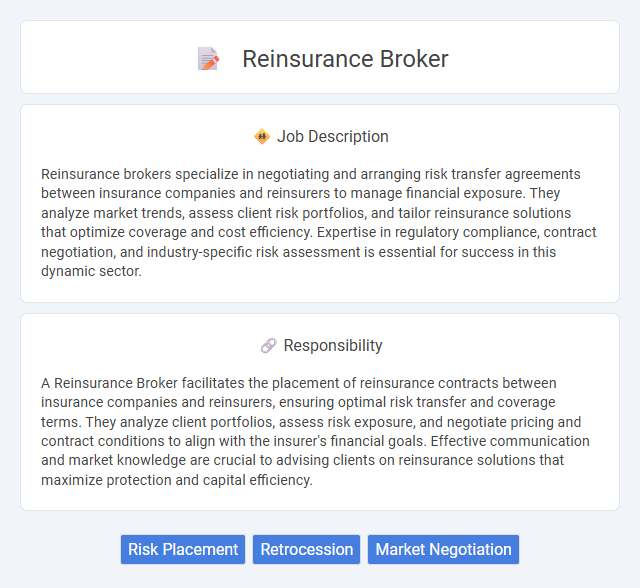
Reinsurance brokers specialize in negotiating and arranging risk transfer agreements between insurance companies and reinsurers to manage financial exposure. They analyze market trends, assess client risk portfolios, and tailor reinsurance solutions that optimize coverage and cost efficiency. Expertise in regulatory compliance, contract negotiation, and industry-specific risk assessment is essential for success in this dynamic sector.
Individuals with strong analytical skills and excellent communication abilities are likely to be well-suited for a reinsurance broker role, as the job requires negotiating complex contracts and assessing risk. Those who thrive in high-pressure environments and enjoy working collaboratively with both insurers and clients may find this career particularly fitting. Conversely, individuals who prefer routine tasks or have difficulty managing multifaceted interactions might find the demands of reinsurance brokering challenging.
Qualification
A Reinsurance Broker typically requires a bachelor's degree in finance, economics, or a related field, combined with strong analytical and negotiation skills. Professional certifications such as the Chartered Property Casualty Underwriter (CPCU) or Associate in Reinsurance (ARe) enhance credibility and expertise in the industry. Experience in insurance underwriting, risk management, and market analysis is crucial for successful client representation and deal structuring.
Responsibility
A Reinsurance Broker facilitates the placement of reinsurance contracts between insurance companies and reinsurers, ensuring optimal risk transfer and coverage terms. They analyze client portfolios, assess risk exposure, and negotiate pricing and contract conditions to align with the insurer's financial goals. Effective communication and market knowledge are crucial to advising clients on reinsurance solutions that maximize protection and capital efficiency.
Benefit
A career as a reinsurance broker may offer significant financial rewards through commission-based earnings linked to large contracts. Professionals in this role might benefit from extensive networking opportunities with insurers and clients, enhancing industry insight and career progression. There is also a probable potential for job stability given the ongoing demand for risk management in the insurance sector.
Challenge
A career as a reinsurance broker likely involves navigating complex risk assessments and constantly evolving market conditions, presenting ongoing intellectual and strategic challenges. The role probably demands strong analytical skills to match client needs with appropriate reinsurance solutions amidst competitive pressures. Successful brokers may need to adapt quickly to regulatory changes and maintain excellent communication with various stakeholders to manage uncertainty effectively.
Career Advancement
A reinsurance broker facilitates risk transfer between insurance companies and reinsurers, playing a vital role in managing complex risk portfolios. Career advancement in this field often involves progressing from junior broker roles to senior broker or account executive positions, with increased responsibility for client relationship management and strategic deal structuring. Gaining industry certifications such as the Chartered Property Casualty Underwriter (CPCU) and developing expertise in specialized markets enhances opportunities for leadership and higher compensation.
Key Terms
Risk Placement
Reinsurance brokers specialize in risk placement by identifying optimal reinsurance solutions tailored to clients' exposure profiles, ensuring balanced risk transfer and capital protection. They leverage deep market knowledge and data analytics to negotiate terms with reinsurers, maximizing coverage efficiency and minimizing premium costs. Expertise in risk assessment and regulatory compliance enables brokers to structure placements that align with both insurer risk appetites and industry standards.
Retrocession
Reinsurance brokers specializing in retrocession play a critical role in facilitating the transfer of risk from primary reinsurers to retrocessionaires, enhancing risk management and capital efficiency. They analyze portfolio exposures to structure retrocession treaties that optimize coverage and cost, leveraging market intelligence and underwriting expertise. Expertise in regulatory compliance and contract negotiation ensures that retrocession agreements align with industry standards and client objectives.
Market Negotiation
Reinsurance brokers specialize in market negotiation by facilitating strategic discussions between insurance companies and reinsurers to secure optimal terms and coverage. They leverage deep industry knowledge, risk analysis, and relationship management to negotiate pricing, contract clauses, and risk-sharing agreements that align with clients' financial goals. Expertise in market trends and regulatory environments enables brokers to advocate effectively for competitive reinsurance solutions tailored to complex risk portfolios.
 kuljobs.com
kuljobs.com